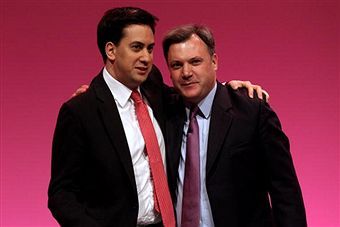 The Institute for Fiscal Studies enjoys quasi-divine status in Westminster: chancellors
and their shadows bother it for its blessing, and Budget Day is never complete until its judgment has been passed. Both parties have bent a suppliant knee before the institute in the past, but the
IFS became particularly important to Labour after it declared last autumn that George Osborne’s policies to be ‘regressive‘. This is why the IFS report on the tax system, released today, is important.
The Institute for Fiscal Studies enjoys quasi-divine status in Westminster: chancellors
and their shadows bother it for its blessing, and Budget Day is never complete until its judgment has been passed. Both parties have bent a suppliant knee before the institute in the past, but the
IFS became particularly important to Labour after it declared last autumn that George Osborne’s policies to be ‘regressive‘. This is why the IFS report on the tax system, released today, is important.
The review, conducted by Sir James Mirrlees, is a damning indictment on tax system that has fallen from 5th to 95th in the World Economic Forum’s tax competitiveness rankings. Mirrlees’ findings have far reaching consequences for debates about tax, welfare and bureaucracy in this country. But his most explosive paragraphs concern the 50p rate (and top rates of taxation in general). Mirrlees writes :
‘It is not clear whether the 50% rate will raise any revenue at all. There are numerous ways in which people might reduce their taxable incomes in response to higher tax rates; at some point, increasing tax rates starts to cost money instead of raising it. The question is, where is that point? Brewer, Saez, and Shephard (2010) addressed precisely this question for the highest-income 1%. Their central estimate is that the taxable income elasticity for this group is 0.46, which implies a revenue-maximizing tax rate on earned income of 56%.29 This in turn (accounting for NICs and indirect taxes) corresponds to an income tax rate of 40%. So, according to these estimates, the introduction of the 50% rate would actually reduce revenue. We do not know with confidence what the revenue-maximizing top tax rate is. But governments do not have the luxury of stopping there: policy must be decided, so, in the absence of compelling evidence, they must take a best guess. The Treasury’s best guess is that the 50% rate will raise some revenue. That is certainly not impossible, but it is certainly uncertain. Whatever the precise revenue-maximizing tax rate, it seems unlikely that much additional revenue can be raised simply by increasing the income tax rate for the very highest earners. But it is important to realize that this is not the only tool available for extracting money from this group. Widening the income tax base—removing reliefs and clamping down on avoidance—not only raises money directly but also reduces the scope for shifting income into tax-free forms and thereby makes tax rate increases more effective revenue-raisers. And there are, of course, other taxes aimed at the wealthy (notably inheritance tax), which might have the potential to raise revenue. In addition, we should not forget that the revenue-maximizing rate is itself not necessarily the rate that we should impose on this group. If we value their welfare at all, or have concerns over long-term behavioural effects, then we might want a rate below the revenue-maximizing rate in any case.’’
Ed Miliband’s speech to the TUC yesterday castigated George Osborne’s “obsession [about] cutting the 50 pence tax rate”. Miliband’s adopted a moral stance: a tax cut, he raged, for the 1 per cent of the population earning more than £150,000 a year, what about the other 99 per cent? He concluded his emotive argument by insisting that it was “nonsense” to say the tax was inefficient. The IFS challenges the economic case for the 50p rate, while pointing out that there are many other ways to tax wealth efficiently, should a government wish to.
The top rate of tax is obviously a current issue within the coalition, with most Tories and many Lib Dems apparently convinced that the taxman should be pursuing the affluence of the undeserving rich, not the merited rewards of hard work. Miliband and Balls seem intent to take a chance on the politically convenient 50p rate (YouGov’s latest poll found that 60 per cent favoured its retention), but they will be on the wrong side of the economic debate if HMRC find that the tax is inefficient when it reports on the subject next year. Gambling economic credibility for transient political gain is a deep risk, especially for this Opposition.






Comments